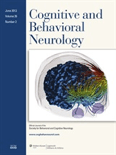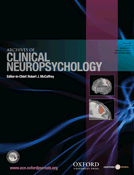
Alzheimer's & Dementia: Diagnosis, Assessment & Disease Monitoring
Scope & Guideline
Empowering breakthroughs in diagnosis and assessment.
Introduction
Aims and Scopes
- Multimodal Biomarkers and Diagnostic Techniques:
Research involving cerebrospinal fluid (CSF), blood-based biomarkers, neuroimaging, and genetic factors to improve the diagnosis and understanding of Alzheimer's disease pathology. - Cognitive Assessment and Monitoring Tools:
Development and validation of cognitive assessment tools, including digital and remote testing methods, aimed at early detection and monitoring of cognitive decline. - Neuropsychiatric Symptoms and Behavioral Factors:
Exploration of the relationship between neuropsychiatric symptoms, behavioral changes, and cognitive impairment in dementia patients. - Lifestyle and Environmental Influences:
Studies examining the impact of lifestyle factors, such as physical activity, diet, and socioeconomic status, on cognitive health and dementia risk. - Health Disparities and Ethnic Variability:
Research addressing the differences in dementia prevalence, risk factors, and outcomes across diverse populations, focusing on health equity and access to care. - Technological Innovations in Research:
Utilization of machine learning, artificial intelligence, and digital health technologies for improving diagnostic precision and understanding of cognitive decline.
Trending and Emerging
- AI and Machine Learning Applications:
There is a rising trend in utilizing AI and machine learning techniques to analyze cognitive decline, identify biomarkers, and improve diagnostic accuracy. - Integration of Lifestyle Factors:
An increasing number of studies are focusing on how lifestyle factors, such as nutrition, physical activity, and social engagement, influence cognitive health and dementia risk. - Biomarker Discovery and Validation:
Research on novel biomarkers, particularly blood-based and neuroimaging biomarkers, is gaining traction as a means to enhance early detection and monitoring of Alzheimer's disease. - Cultural and Social Determinants of Health:
A growing interest in understanding how cultural and social determinants influence dementia prevalence and outcomes, particularly in diverse populations, is evident in recent publications. - Digital Health Interventions:
Emerging interest in digital tools and remote monitoring technologies for assessing cognitive function and delivering interventions, especially in the context of the COVID-19 pandemic. - Comorbidity and Multimorbidity Research:
Research exploring the interactions between Alzheimer's disease and other chronic conditions, highlighting the complexity of patient care and the need for integrated health strategies.
Declining or Waning
- Traditional Cognitive Assessment Methods:
There has been a noticeable decrease in studies solely focused on conventional cognitive assessments, as the field moves towards more innovative and diverse methods of evaluation. - Single-Factor Risk Assessments:
Research that examines isolated risk factors for dementia without considering the multimodal interactions has become less common, with a growing emphasis on comprehensive, integrative approaches. - Aging without Cognitive Decline Focus:
Studies that exclusively investigate aging without a direct connection to cognitive decline or dementia have diminished, as the focus shifts towards understanding the cognitive trajectories related to aging. - Generalized Dementia Studies:
Research that does not differentiate between types of dementia (e.g., Alzheimer’s versus Lewy body dementia) is less frequent, as there is a growing recognition of the need for subtype-specific investigations.
Similar Journals

Cerebral Circulation-Cognition and Behavior
Transforming Understanding of Cerebral Dynamics and BehaviorCerebral Circulation-Cognition and Behavior is an impactful journal published by Elsevier that focuses on the intersections of cerebral circulation, cognitive function, and behavioral science. Since its establishment in 2020, the journal has provided a vital platform for researchers and professionals in the fields of Behavioral Neuroscience, Biological Psychiatry, and Cognitive Neuroscience. With a current classification in the Q3 quartile across several neuroscience categories and a promising trajectory during its converged years (2020-2024), the journal highlights significant advancements in our understanding of the neural underpinnings of behavior. Although it is not open access, its commitment to quality research makes it an essential resource for anyone engaged in neurological, cognitive, and psychiatric studies. As discoveries in these fields continue to grow, Cerebral Circulation-Cognition and Behavior remains dedicated to disseminating influential findings that bridge the gap between cognition, behavior, and neural health.

Cognitive and Behavioral Neurology
Advancing the Frontiers of Cognitive and Behavioral NeurologyCognitive and Behavioral Neurology is a prominent peer-reviewed journal dedicated to advancing the understanding of cognitive and behavioral aspects of neurological disorders. Published by Lippincott Williams & Wilkins, this journal has established itself as a vital resource for researchers, clinicians, and students in the fields of cognitive neuroscience, neuropsychology, and psychiatry. With an ISSN of 1543-3633 and an E-ISSN of 1543-3641, it offers a robust platform for the dissemination of high-quality research, as evidenced by its positioning in the Q3 quartiles across various categories, including Cognitive Neuroscience and Psychiatry. The journal, which has been actively publishing since 2003, encourages innovative studies that explore the intersection of cognition and behavior in neurological contexts. As a vital contributor to the academic dialogue on these topics, it provides an essential archive of findings and discussions that inform clinical practice and educational approaches, reflecting its commitment to improving patient outcomes and enhancing neurological science.

Movement Disorders Clinical Practice
Transforming understanding into effective treatments.Movement Disorders Clinical Practice, published by WILEY, is an essential peer-reviewed journal dedicated to advancing the understanding and treatment of movement disorders from a clinical perspective. With an ISSN of 2330-1619, this journal serves as a vital resource for researchers, clinicians, and students engaged in neurology and clinical neuroscience. Since its inception in 2014, the journal has established itself within the medical community, currently positioned in the Q2 category for both Neurology and Neurology (Clinical), reflecting its influence and reputation. Although it does not offer open access, the journal is integral for disseminating high-quality research and clinical insights, thereby contributing significantly to improved patient care and outcomes in the field of movement disorders. Based in Hoboken, NJ, it continues to attract contributions from leading experts and aims to foster a deeper understanding and dialogue surrounding contemporary challenges and advancements in movement disorder treatment.

American Journal of Alzheimers Disease and Other Dementias
Unlocking insights into Alzheimer's and dementia.The American Journal of Alzheimer's Disease and Other Dementias, published by SAGE Publications Inc, is a pivotal resource for researchers, clinicians, and students engaged in the study of neurodegenerative diseases, particularly Alzheimer’s disease and various forms of dementia. With an impact factor reflecting its significance in the field, the journal boasts an open-access format since 2020, ensuring that groundbreaking research is accessible to a global audience. The journal holds prestigious Q2 rankings across several categories, including Clinical Psychology, Geriatrics and Gerontology, Neuroscience, and Psychiatry and Mental Health. Covering a wide spectrum from 1986 to 2024, it provides essential insights into innovative treatments, care strategies, and the latest findings in dementia research, solidifying its importance in fostering knowledge and advancing the field. With a commitment to high-quality scholarship, this journal is an indispensable tool for advancing understanding in the dynamic landscape of dementia studies.

Alzheimers & Dementia-Translational Research & Clinical Interventions
Empowering Clinical Practice through Cutting-Edge ResearchAlzheimer's & Dementia: Translational Research & Clinical Interventions, published by WILEY, is a premier open-access journal that has been at the forefront of innovations in the field of neurology and psychiatry since its inception in 2015. With an impressive impact factor reflecting its high-quality research contributions, this journal has been designated as Q1 in both Neurology (Clinical) and Psychiatry and Mental Health categories for 2023, ranking in the top percentiles of their respective Scopus fields. The journal aims to bridge the gap between research and clinical practice, promoting the translation of scientific discoveries into real-world applications for Alzheimer's disease and other dementias. Positioned in the United States, it is a valuable resource for researchers, clinicians, and students dedicated to advancing knowledge and treatment approaches in these critical areas. With its commitment to open access, the journal ensures that vital research is accessible to a broad audience, fostering collaboration and knowledge sharing across the global scientific community.

JOURNAL OF CLINICAL AND EXPERIMENTAL NEUROPSYCHOLOGY
Connecting empirical research with clinical application.The Journal of Clinical and Experimental Neuropsychology, published by Taylor & Francis Inc, stands as a pivotal resource in the realms of clinical psychology and neuropsychology. With an ISSN of 1380-3395 and an E-ISSN of 1744-411X, this journal has been a hallmark of scholarly excellence since its inception in 1985, continuing to shape the fields until 2024. It is renowned for its rigorous peer-reviewed articles and has garnered significant recognition, achieving a Q2 ranking in Clinical Psychology and Q3 rankings in various other relevant categories as of 2023. Serving as a bridge between clinical practice and experimental research, the journal underscores the critical role of neuropsychological assessment and intervention in enhancing mental health outcomes. Although not an open-access journal, it provides significant insights and empirical data that are crucial for researchers, clinicians, and students dedicated to advancing the understanding of cognitive functioning and psychological health. The journal's commitment to disseminating high-quality research contributes to its reputation and impact, making it a vital resource for those engaged in the study of neuropsychology and its clinical applications.

Aging Brain
Fostering Innovation in Gerontology and NeuroscienceAging Brain is a premier Open Access journal published by Elsevier, dedicated to advancing the understanding of the neurobiological changes associated with aging. Since its commencement in 2021, this journal has been pivotal in disseminating high-quality research that explores the intricate relationships between aging and cognitive functions, neurological disorders, and overall brain health. With a notable commitment to open accessibility, Aging Brain ensures that vital findings are available to a global audience, fostering collaboration and innovation in the field. Researchers, healthcare professionals, and students alike will find a rich repository of cutting-edge studies, reviews, and insights aimed at addressing the complexities of the aging brain. The journal stands as an influential platform for those passionate about enhancing the quality of life for the aging population, making it a valuable resource in gerontology and neuroscience.

JPAD-Journal of Prevention of Alzheimers Disease
Exploring Breakthroughs in Neurology and Mental HealthJPAD - Journal of Prevention of Alzheimer’s Disease, published by Springer Basel AG, is a premier academic journal dedicated to advancing research in the critical field of Alzheimer’s disease prevention. Its impactful contributions to the fields of neurology, psychiatry, and mental health have led it to achieve a Q1 ranking in multiple categories, including neurology (clinical) and psychiatry and mental health. Since its inception in 2017, JPAD has become an essential platform for researchers and professionals aiming to stay at the forefront of developments in Alzheimer’s disease research, prevention strategies, and innovative therapies. The journal provides a valuable open access option for disseminating high-quality research to a global audience, enhancing its visibility and impact. With its strategic focus and rigorous peer-review process, JPAD is committed to fostering collaboration and knowledge exchange among scientists, clinicians, and practitioners, ultimately contributing to the global effort to combat Alzheimer's disease.

ARCHIVES OF CLINICAL NEUROPSYCHOLOGY
Uncovering the Complexities of the Human MindARCHIVES OF CLINICAL NEUROPSYCHOLOGY is a premier academic journal dedicated to the vital intersections of clinical psychology, neuropsychology, and psychiatry, offering researchers and clinicians a platform to publish cutting-edge findings and comprehensive reviews. Published by Oxford University Press, the journal aims to advance the understanding of the cognitive and psychological aspects of neurological conditions through rigorous empirical research and innovative methodologies. With an impressive range of quartile rankings, including Q2 in Clinical Psychology and Neuropsychology, the journal stands out for its commitment to enhancing clinical practices and improving patient outcomes. Although it does not offer open access, its reputation is underscored by a competitive impact factor, making it a critical resource for professionals in the field looking to stay informed on the latest developments. The journal has been a respected outlet since 1986, and as it continues into 2024, it remains a beacon for scholarly discourse in neuropsychology and mental health.

JOURNAL OF ALZHEIMERS DISEASE
Fostering breakthroughs in neurodegenerative research.Journal of Alzheimer's Disease, published by IOS Press, stands as a pivotal resource in the fight against Alzheimer's and related neurodegenerative disorders. With an ISSN of 1387-2877 and an E-ISSN of 1875-8908, this esteemed journal has evolved since its inception in 1998, providing a vital platform for academic research and clinical practice in the realms of Clinical Psychology, Geriatrics and Gerontology, Neuroscience, and Psychiatry and Mental Health. Ranked in the Q1 category across several disciplines, including Clinical Psychology and Geriatrics, this journal not only highlights significant advancements in understanding Alzheimer's disease but also fosters interdisciplinary dialogue among researchers, healthcare professionals, and policymakers. Boasting robust Scopus rankings—such as 49th in Clinical Psychology and 29th in Geriatrics—this journal is committed to disseminating high-quality research that informs both therapeutic strategies and public health initiatives. The Journal of Alzheimer's Disease is an essential resource for anyone dedicated to exploring the complexities of cognitive decline and enhancing care for affected individuals.